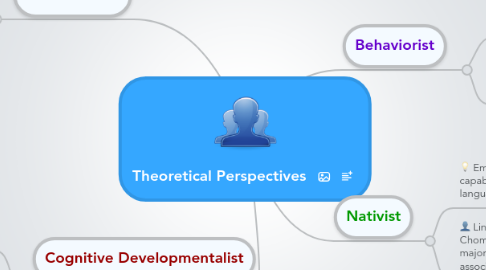
1. Interactionist
1.1. Focuses on the primary role of sociocultural interaction in children's development of language knowledge.
1.1.1. Children acquire language through their attempts to communicate with the world around them. This perspective contributes to our understanding of the ways in which children acquire pragmatic language knowledge.
1.2. Vygotsky emphasized the role of social interaction in language development.
1.2.1. Believed language development is influenced by the society in which the individual lives: "higher mental functions are socially formed and culturally transmitted."
2. Cognitive Developmentalist
2.1. Language is acquired as maturation occurs and cognitive competencies develop.
2.1.1. Assumes that cognitive development is a prerequisite and foundation for language learning.
2.2. Jean Piaget is the major theorist associated.
2.2.1. Believes language appears when children's cognitive growth reaches a point where they use and manipulate symbols. After object permanence is acquired, children begin to use symbols such as words to refer to objects and actions.
3. Nativist
3.1. Emphasizes inborn or innate human capabilities (nature) as being responsible for language development.
3.1.1. Children learn language by discovering the structure of their language.
3.2. Linguist Noam Chomsky is the major theorist associated.
3.2.1. Contends that all people inherently have the capacity to acquire language due to cognitive structures that process language different from other stimuli.
4. Behaviorist
4.1. Emphasizes the role of "nurture" and considers learning to occur based on the stimuli, responses, and reinforcements that occur in the environment.
4.1.1. A child is a "blank slate," and learning occurs due to associations established between stimuli, responses, and events that occur after the response behavior. Language is learned as a result of these associations.
4.2. B.F. Skinner is the major theorist associated.
4.2.1. Complex speech (phrases and sentences produced by a child) is considered evidence that a chain of speech units has been reinforced. Reinforcement often takes the form of attention, repetition, and approval. This type of conditioning (learning) is called operant learning.
